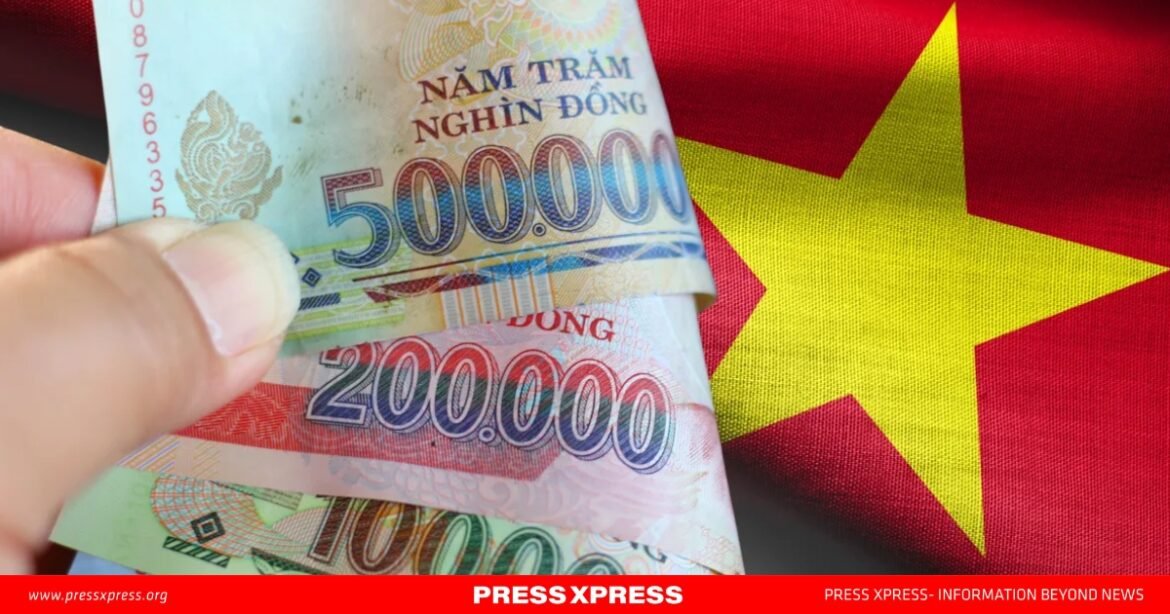Vietnam’s currency fell to an all-time low against the US dollar, driven by a combination of global and domestic economic pressures and adjustments by the central bank.
On Monday, the dong weakened by 0.1%, reaching 25,485 per dollar, surpassing its previous record low in May. Emerging-market currencies, including the dong, have struggled as the dollar continues to strengthen. This rise has been fueled by Donald Trump’s election victory and the Federal Reserve’s hawkish stance. Trade-dependent economies like Vietnam remain particularly exposed to concerns over potential US tariffs, with currencies such as the South Korean won also touching their lowest levels since 2009.
“The dong’s decline is largely due to rising demand for US dollars ahead of Trump’s inauguration next month,” said Tran Tuan Minh, CEO of TVI, a Hanoi-based equity research and investment firm. Minh explained that Vietnamese companies often require more dollars at year-end to settle international contracts, adding further downward pressure on the currency.
The State Bank of Vietnam (SBV) set the daily reference rate at a record low of 24,327 dong per dollar on Monday, allowing the currency to fluctuate within a 5% band on either side. The central bank has reiterated its commitment to intervening in the market by selling dollars to stabilize the dong if needed.
“We expect the dollar to strengthen further in the short term, likely prompting the central bank to step up interventions,” Minh added. In the black market, the dong was reported to have dropped as low as 25,850 per dollar on Monday, according to state broadcaster Voice of Vietnam.
Outlook for 2025: Volatility Ahead for the Dong
Looking to 2025, the Vietnamese dong is expected to depreciate by around 3%, according to Michael Kokalari, chief economist at VinaCapital. In a report titled Looking Ahead at 2025, Kokalari predicted that “another volatile year” awaits the dong, largely due to external factors like US inflation dynamics and trade policies under Trump’s administration.
“We foresee fluctuations in the dong throughout 2025, but the USD-VND exchange rate should ultimately see a manageable 3% depreciation,” Kokalari noted. He highlighted that US inflation, driven by structural factors, is expected to rebound early in 2025 regardless of the presidential outcome. This, coupled with uncertainty over Federal Reserve rate cuts, could maintain upward pressure on the dollar.
Kokalari also pointed out Vietnam-specific vulnerabilities, such as the country’s foreign exchange reserves falling below three months’ worth of imports. Limited reserves reduce the central bank’s ability to defend the dong during periods of pressure. Additionally, Vietnam’s trade surplus, currently at about 6% of GDP, is expected to shrink as FDI firms rebuild depleted input inventories, leading to faster import growth than exports.
The SBV responded to earlier pressures in 2023 by tightening monetary policy and selling approximately $6 billion of foreign exchange reserves. However, the remaining reserves, estimated at $87 billion, are relatively low and may constrain future interventions.
Predictions for the Exchange Rate
Standard Chartered forecasts the USD-VND exchange rate to hit 25,250 by the end of 2024 and rise to 25,450 by Q2 2025, assuming continued Federal Reserve rate cuts in the first half of the year. However, the dollar is anticipated to strengthen in the second half of 2025 as Trump’s fiscal and trade policies, including potential tariffs, are clarified and implemented.
“While the Fed’s rate cuts should generally support Asian currencies, including the dong, stronger-than-expected US economic data and trade uncertainties could create headwinds for currency stability,” Standard Chartered noted.
As of Friday, the State Bank of Vietnam set the daily reference exchange rate for the dollar at 24,324 dong, with commercial banks allowed to trade within a range of 23,108 to 25,540 dong. Since the beginning of the year, the dong has depreciated by about 4.1% against the dollar, nearing the 4.6% peak seen in May, according to MB Securities.
The dong’s performance underscores the challenges facing Vietnam’s economy as it navigates global uncertainties and domestic vulnerabilities in the coming year.


